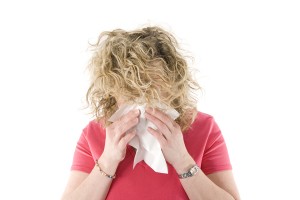 A sore throat and runny nose — common symptoms of a cold — are nothing to sneeze at. In a study in the Archives of Internal Medicine, one researcher estimates that the common cold costs our society billions of dollars in over-the-counter drugs, prescription medicines, sick days and more.
A sore throat and runny nose — common symptoms of a cold — are nothing to sneeze at. In a study in the Archives of Internal Medicine, one researcher estimates that the common cold costs our society billions of dollars in over-the-counter drugs, prescription medicines, sick days and more.
The CDC reports that American adults catch the common cold approximately three times per year, with most of these colds taking place during the winter. This winter, you no longer have to be a slave to the tissue box. A combination of lifestyle changes and herbal remedies can help you to boost your immune system and survive cold season.
Drink Chicken Soup
Your grandma may have been right when she forced you to drink bowls and bowls of chicken soup whenever you felt sick. It’s a centuries-old home remedy, and scientists are now discovering that there may be merit to this practice. One study found that chicken soup worked as an anti-inflammatory agent, helping to reduce symptoms of the common cold in our respiratory tract. Another study, this one in the American Journal of Therapeutics, found a compound in chicken soup called carnosine that may also help reduce inflammation and halt the development of the common cold.
Get Steamy
During the winter, the cold, dry air can really wreak havoc on our health. Researchers have found that maintaining the proper level of humidity in a room can reduce a virus’ ability to survive. Dry air can also lower our defenses to the cold virus and exacerbate the symptoms of the common cold. Run a humidifier in your living space, or try sitting in a hot, steamy shower.
Juice Some Ginger Root
Whether in supplement form, in a soup, or juiced and added to your favorite green smoothie, this pungent root has been shown to fight the common cold effectively. A study in the Journal of Ethnopharmacology found that ginger didn’t just help fight the common cold, but it also helped block infections from many other viruses.
Spice Up Foods with Garlic
Garlic is high in various antioxidants and beneficial compounds, but here’s one more reason to mince it up and add it to your next meal. A double-blind, placebo-controlled study in the Advances in Therapy Journal found that garlic lowered the incidences of cold infections in study groups. That may be because garlic’s many compounds work as antiviral agents.
How to Protect Yourself and Others
Once you are exposed to a cold or get a cold, the CDC recommends a few practical ways to limit your risks and reduce the risks of exposing your friends and loved ones to the virus:
- Wash your hands often with soap and water. Scrub them for 20 seconds, and help young children do the same. If soap and water are not available, use an alcohol-based hand sanitizer. Viruses live on your hands, and regular handwashing can help protect you from getting sick.
- Avoid touching your eyes, nose, and mouth with unwashed hands. Viruses can enter your body this way and make you sick.
- Stay away from people who are sick. Sick people can spread viruses that cause the common cold through close contact with others.
If you have a cold, you should follow these tips to prevent viruses from spreading to other people:
- Stay at home while you are sick.
- Avoid close contact with others, such as hugging, kissing, or shaking hands.
- Move away from people before coughing or sneezing.
- Cough and sneeze into a tissue then throw it away, or cough and sneeze into your upper shirt sleeve, completely covering your mouth and nose.
- Wash your hands after coughing, sneezing, or blowing your nose.
- Disinfect frequently touched surfaces, and objects such as toys and doorknobs.
There is no cure for a cold. To feel better, you should get lots of rest and drink plenty of fluids. Over-the-counter medicines may help ease symptoms but will not make your cold go away any faster. Always read the label and use medications as directed. Talk to your doctor before giving your child nonprescription cold medicines, since some medicines contain ingredients that are not recommended for children. Learn more about symptom relief.
You should call your doctor if you or your child has one or more of these conditions:
- a temperature higher than 100.4° F
- symptoms that last more than 10 days
- symptoms that are severe or unusual
If your child is younger than 3 months old and has a fever, you should always call your doctor right away. Your doctor can determine if you or your child has a cold and can recommend therapy to help with symptoms.

